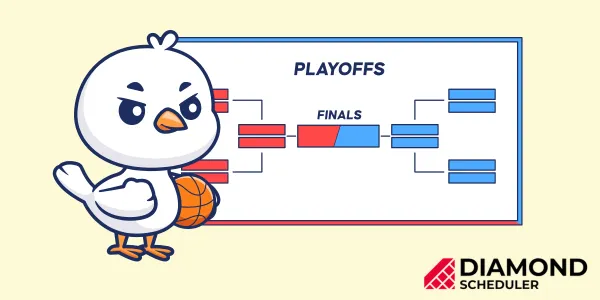
Bracketing It Down: The Single Elimination Bracket
Scheduling is often the most daunting task for any league owner as they try to find a way to fairly yet competitively seed teams for an upcoming match or tournament. With more than one tournament bracket type available for league owners, choosing the right one is essential for the success and excitement of that tournament.
Scheduling software can make this task easier. With single-elimination bracket software becoming increasingly popular, let's look at what it entails, why it is used, and why a large number of sports league owners should use this software to help make scheduling tournament matches a breeze.

Tournament or playoff season is the most exciting time of a sports league
The importance of scheduling in sports leagues and tournaments
A good schedule can make a big difference in any tournament. A schedule affects not only the fairness of the competition but also the outcome of each match, fan attendance, and the interests of sponsors who may wish to advertise their businesses at the venues.
Using scheduling software allows for structure and almost a routine approach to the scheduling of matches in a tournament. This streamlined, automated approach to a league owner’s scheduling processes not only saves time but resources too.
The single elimination bracket format
The single-elimination bracket format, also known as the sudden death or knockout round, is a simple format. The "win or go home" match-up essentially sees the winners of each match advancing to the next round, while the losers are eliminated from the tournament losing their chance at competing for a championship.
This format is not as commonly used as others. Even so, single-elimination is still a popular format for league owners that want to ensure their tournaments provide exciting, unpredictable, and competitive matchups for fans and teams.
The benefits of using scheduling software for league owners
Scheduling and team management software, as used by league owners during "March Madness," has its place in setting fair, accurate schedules for players and teams. Here are a few other benefits that have been noted when using Diamond Scheduler or other scheduling software:
Saves time and resources
Ensures controlled access and secure data storage
Improved communication between league owners and players or fans
Helps league owners stay organized and in control of their schedules
Diamond Scheduler and other scheduling softwares are excellent for storing, processing, and securing data needed by league owners when scheduling their tournaments using single elimination brackets. This, in turn, helps league owners to:
Effectively manage their teams and players competing
Streamline the registration process for new users of the platform
Easily and effectively manage their teams
The single elimination bracket
Definition and concept of the single elimination bracket
A single elimination bracket is one of the most exciting formats to use when scheduling tournaments or matches and is often referred to as the "sudden death" or "knockout" format. This is largely due to its structure that sees winning teams being pushed through to the next level or division and losing teams being eliminated from the competition completely.
This format is opposite to tournaments that consist of several rounds per matchup. In this type of tournament match-up which is also called a playoff series, matches are played until the finals, where there is one overall winner of the series, tournament, or competition. This is largely how the NBA playoffs operate, with multiple teams competing for that one coveted spot, but each match-up consists of several games.
The number of rounds in a single elimination tournament is based on how many teams there are, with the number of teams being determined by the complexity of the bracket format used. This might sound rather complicated, but it can be simplified with the use of scheduling software that essentially does the hard work for the league owner.
The structure of single elimination brackets
The seeding process ultimately determines the structure of any tournament bracket. Seeding is the process of choosing teams based on their past play or performances. These stats are then incorporated and measured by their ranking within their divisions or conferences.
With single elimination brackets, the loser of each match is eliminated from the game, with no chance of redeeming themselves in any future games of the tournament. The winner will, however, go on to the next round to face the winners of another match.
The role of seeding and its impact on the bracket
Seeding is a common selection process used by top sports leagues. This includes the NBA, NFL, NCAA, and the MLB. For the purpose of selection, a seed is a ranking used to determine the better teams or players from the poorer-performing ones.
In the case of the NBA, NFL, NCAA, and MLB, the team with the most wins will receive the highest seed (number 1), while those who perform poorly or do not win any matches will be given a lower seed or ranking. These higher-ranking teams or seeds will go head-to-head with other teams that have higher seeds, while those with lower will face other lower-seeding teams.
So why is seeding such an integral part of the selection process, you ask? To put it in simple terms, it is to ensure that the very best teams are the ones that will go head-to-head towards the end of the competition or tournament.
Seeding, essentially, helps create the road map of how the single-elimination tournament will play out. It also helps determine which teams should face each other, creating a fair yet exciting tournament for players and spectators.
NCAA's seeding teams for men's basketballThe advantages of single elimination brackets
As we have mentioned in our previous sections, there are many advantages to using single-elimination bracket formats for the scheduling of any tournaments or matches.
Here are a few more:
1. Simple and straightforward
Single elimination bracket formats are both simple and straightforward to use as winning teams are elevated through to the next round while losers are eliminated entirely.
2. Excitement and intensity of an elimination-style competition
Sports fans know the excitement that crops up around tournament season as they watch their favorite team battle it out for the top stop in the finals. Sports leagues like the NHL and NBA changed their playoff or seeding format to increase this excitement and bring a new sense of intensity to the sport.
3. Time efficiency compared to other bracket formats
The single elimination brackets format is far less time-consuming than other bracket formats, which include additional matches for losers of each game. With only the winning teams to add to future matches in a tournament, the scheduling system becomes more efficient.
Once a team is eliminated, there are no more chances to redeem themselves, giving fans and spectators the opportunity to focus on the "better" teams that will surely put on a great performance as the tournament progresses.
4. Opportunities for underdogs and upsets in the tournament
Single elimination brackets might not include losing teams in future matches, but it does still allow the opportunity for "underdogs" to have their chance at playing against some high-seeding teams. This is where seeding comes into play, as high seeds (the winner) are matched with other high seeds, and lower seeds are eliminated when they lose their game.
5. Maximizing attention for higher viewership
Since single-elimination is a "one and done" or a "win or go home" elimination format, fans are more likely to give their undivided attention, knowing that their team has one chance to advance. This increase in viewership or "eyes" will attract more high-paying sponsors or partnerships to each match as brands have a better chance of showcasing their products without viewers wanting to leave their screens.
The NCAA league is known for its support of the "underdogs," and this draws in many sports fans from across America who are itching to get a glimpse of up-and-coming players that could soon be part of the larger associations and leagues like the NBA, NHL, MLB, and others.
There is a "science" behind supporting the underdogs in each league, and this stems from their unpredictability and the thrill of watching a lesser-known team rise up to the challenge of facing a big name in the league.

Single-elimination tournaments add more excitement and unpredictability to tournaments
Challenges and considerations of using scheduling software for league owners
While there are many benefits or advantages to using scheduling software for league owners, there are also a few challenges that come into play.
1. Date of the scheduled tournament
Scheduling software often relies on accurate dates to successfully schedule matches for a tournament. League owners must coordinate with venues and team owners to secure time slots for the upcoming tournament.
2. Managing the bracket size and number of participants
The more teams that are involved, the larger the bracket size would need to be to determine a fair yet exciting schedule for the tournament.
3. Determining seeding criteria and methods
The majority of seeding methods are based on the number of games a team has played and won. As for the NHL, a general breakdown of its playoff seeding is regulation wins being the first tiebreaker and regulation plus overtime wins being the second tiebreaker. The NHL also has other formats that are involved with the seeding process, such as wildcard entries. Seeding criteria and methods could make for tricky scheduling if the software used does not allow for the various methods and criteria to be used.
4. Dealing with the potential of wildcard entries
The NFL is notorious for its wildcard entries, and this could prove to be quite the challenge when it comes to using scheduling software to determine the upcoming matches in a tournament. Wildcard entries are often added without having qualified for a spot in the playoffs, making scheduling that much more difficult even when scheduling software is used.
5. Ensuring fairness and integrity throughout the tournament
Ensuring fairness throughout a tournament can be a tricky task. Seeding single-elimination brackets and using scheduling software can minimize the challenge of creating a fair selection process
NFL super wild card game picksThe benefits of using scheduling software
Scheduling software, like that of Diamond Scheduler and others, can help take the guesswork out of selecting teams for matches in any tournament. With single-elimination tournament scheduling now available for Diamond Scheduler users, here are the overall benefits for league owners:
Automation and ease of generating single-elimination brackets tournaments
Flexibility to customize scheduling parameters
Managing multiple divisions or leagues simultaneously
Balancing fairness and competitiveness in matchups
Incorporating rest days and managing player fatigue
Utilizing software features for scheduling optimization
Leagues that use scheduling software
Top sports leagues make use of Diamond Scheduler and other scheduling software to both streamline and automate their tournament scheduling processes.
Here are a few of the sports leagues that currently use this software to make their scheduling processes fair:
NHL - National Hockey League
NFL - National Football League
NCAA - National Collegiate Athletics Association
MLB - Major League Baseball
NBA - National Basketball Association
MLS - Major League Soccer
NBL - National Baseball League
Frequently Asked Questions
Want to know more about single elimination brackets? Our FAQ guide might just have the answers to your burning questions.
1. Is the single elimination bracket format the best to use for all sports?
No. While a single elimination bracket tournament is popular, they are by no means the best or only format to use for all sports. With football and baseball often allowing wildcard entries, single-elimination bracket formats might not be the best.
2. What is a seed?
A seed is a selection process that assigns sporting teams a rank based on their performance during a match or season. These seeds are then used to determine their ranking on the scoreboards, divisions, or conferences and will determine their opponents in tournaments.
3. How many elimination brackets are there?
While this article focuses on the single elimination bracket format, there are, in fact, six elimination brackets to choose from. Each has its own pros and cons and will determine the selection process for any sports league tournament.
4. Can scheduling software be used to improve the fairness and integrity of the tournament selection process?
Yes! Fairness and integrity are just two of the many benefits of choosing scheduling software to automate and streamline the selection process.
5. What scheduling software should I choose?
The scheduling software you choose should take into account the type of sport, the seeding process, the number of teams or players included, and any other variables that could impact the selection process. Diamond Scheduler is a popular and effective software package that incorporates just about any variables you choose, resulting in a fair and accurate selection process that will surely make a great tournament for spectators.
To recap
The single elimination bracket is a popular and effective selection method used by some of America's top sporting leagues to bring maximum excitement and unpredictability to just about any tournament. With benefits like simplicity, excitement, time efficiency, and an opportunity to include "underdogs" in the tournament, single elimination brackets streamline the selection process.
Scheduling software like that of Diamond Scheduler includes single-elimination brackets as a feature, allowing league owners to focus their time and efforts on the more important aspects of running a league.
Choose scheduling software that includes tournament schedules, more specifically, single elimination brackets and take the guesswork out of scheduling and see what a difference the right software can make.
Thalia Oosthuizen has been writing in a professional capacity for over a decade. Her love for sports has led her down the path of sports writing, where her passion and skills combine. Thalia is a runner, cyclist, and swimmer, and enjoys playing tennis and hockey. Her favorite sports teams include Chelsea F.C. and the Georgian Lions Rugby Club.
About Diamond Scheduler
Diamond Scheduler makes planning your league’s complex season easier than ever. Create your first schedule in minutes for free. It's fast, fun, and simple.



